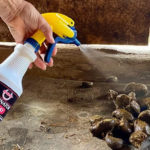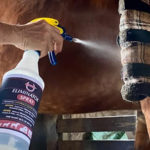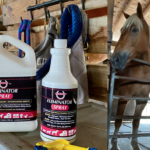Flies Disappear After Simple Discovery at Popular Florida Horse Ranch
WHEN COMMON SENSE PREVAILS
A few years ago, hoof care researchers from SBS EQUINE were on assignment at Florida’s Everglades Ranch during the busy fly season. They noticed how annoying the horse-flies, gnats, and mosquitoes were to the horses and handlers at the ranch.
Although insect control was outside their purview as hoof care specialists, SBS Researchers checked out locally available pesticides for some relief. Any remedy had to be consistent with the company’s mission statement established over thirty years ago – “safe for the horse, humans, and the environment.” However, spraying poisons into the air didn’t seem consistent with these principles.
THE DINNER BELL FOR INSECTS
SBS Researchers soon discovered that studies from entomologists have proven that the primary signal for food and breeding for insects are odors. Garments, people, and pets emit odors that attract blood-feeding flies, mosquitoes, gnats, ticks, and bed bugs. Odors to an insect means that dinner is ready.
Odors are powerful signals to biting insects. For example, the heat generated from  decaying organic matter, such as fresh manure, provides an odor that flies can follow up to four miles away. This may be the reason why Florida has the largest horse-fly population in the nation.
decaying organic matter, such as fresh manure, provides an odor that flies can follow up to four miles away. This may be the reason why Florida has the largest horse-fly population in the nation.
The average 1000 pound horse produces over 31 pounds of manure a day. One study showed that a single pound of fresh manure in the warm season could generate 685 fly larvae. House flies can go from egg to maggot (larva) to pupa to adult in as little as ten days. The production of manure from just one horse can result in over 21,000 flies per day or about 147,000 flies per week!
HOW MALODORS INFLUENCE DISEASE TRANSMISSION
The massive volume of manure piles produced by horses, especially in the summer months, creates the perfect breeding ground for flies and other insects. There’s evidence that these insects are a significant health risk due to their ability to reproduce quickly and transmit diseases.
Insects feed and breed in the filth where germs, bacteria and transmissible diseases thrive. Disease prevention is another reason why fly and insect control is so important. So instead of using traditional pesticides that kill pests or may harm the environment, SBS Researchers chose a novel approach. They incorporated new technology that is environmentally friendly and deters blood-feeding insects instead of killing them.
The researchers learned of a newly patented soya-derived cationic compound that was  statistically similar to DEET in controlled laboratory tests. As the key component to a natural spray product, the compound was shown to be safe and effective for personal care and industrial applications for insect and odor control.
statistically similar to DEET in controlled laboratory tests. As the key component to a natural spray product, the compound was shown to be safe and effective for personal care and industrial applications for insect and odor control.
ITS LIKE BEING INVISIBLE TO INSECTS
The compound works by releasing proprietary electrically-charged Ion particles with a positive polar charge. They bind to the negative polar charge of the lipid-layer membranes of malodorous molecules (bacterial odors), and captures and sheds them…neutralizing the malodors that attract insects to the garments, people and pets.
The Spray has over 101 uses on farms, ranches, kennels, households, institutional and industrial services. Studies on horse ranches show that it deters horse-flies and other biting insects from feeding or breeding in manure piles, face masks, fly boots, horse blankets, open sores, wounds, urine spots, garments, and hair & skin of horses, people & pets.
The product incorporating this unique technology is called SBS Eliminator Spray. It is available in a quart spray or gallon refill. It can be used for insect and odor control in poorly ventilated environments, outdoor patios, bathrooms, basements, barns, horse stables & trailers, sanitary landfills, carpets/garments, boots, athletic equipment, tobacco odor and more. For more information and articles please visit www.sbsequine.com.
available in a quart spray or gallon refill. It can be used for insect and odor control in poorly ventilated environments, outdoor patios, bathrooms, basements, barns, horse stables & trailers, sanitary landfills, carpets/garments, boots, athletic equipment, tobacco odor and more. For more information and articles please visit www.sbsequine.com.




